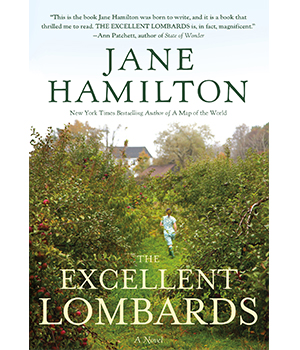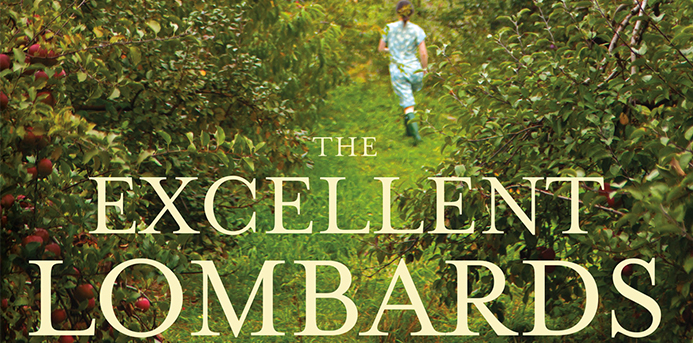Jane Hamilton, the best-selling author of “The Book of Ruth,” winner of the PEN/Hemingway Award for First Fiction; and “A Map of the World,” a New York Times Notable Book of the Year that was also named one of the top 10 books of the year by Entertainment Weekly, Publishers Weekly, the Miami Herald, and People magazine and an Oprah Book Club pick; “Disobedience;” and “The Short History of a Prince,” married an apple farmer at age 23 and settled into life on her husband’s family’s farm, Ela Orchard, where they raised two children. The farm bears resemblance to the setting of her new novel, “The Excellent Lombards,” published in April. We recently talked to the Oak Park native and Carleton College grad about the book and its connections to her life on the Southern Wisconsin farm — and got the scoop on how you can visit it this fall!
Make It Better: At this time of year, it’s a particular treat it to have an engaging and beautifully crafted novel bring to life the charm and challenges of apple farms in Southern Wisconsin. If a reader of “The Excellent Lombards” visits Ela Orchard, how familiar will the environs feel? What differences would they note?
Jane Hamilton: The book is fiction, the characters fictional. I have no interest in writing a memoir, none! But I happen to live on a farm that is beautiful, productive, interesting, and has historic interest, too, with evidence of Native American life, and the teamsters coming across the land in the late 1800s, and traces of early Wisconsin farming. I used that very real property as a springboard into my fictional world. The apple barn at the real farm is quite like the one that Mary Frances imagines she will one day own, and the fragrance within is exactly as she describes it. To me the fictional world and the real world are entirely separate, so I leave it to the reader to make his own connections.
 Please tell us about the inspiration your own life at Ela Orchard provided for the setting, plot and characters in your book.
Please tell us about the inspiration your own life at Ela Orchard provided for the setting, plot and characters in your book.
The present partners at the Orchard, as well as I myself, are growing older. (How did that happen?) I suppose it’s true that I’ve been a bit obsessed about the matter of succession: I call this problem of ours “Who Will Run The Frog Hospital” after Lorrie Moore’s beautiful novella of that same name. WHO WILL RUN OUR FROG HOSPITAL?!! Succession brings up all kinds of rich novelistic questions: Who gets to stay in the family business and on the property? Who stays but shouldn’t have stayed? Who wants to stay but ends up being cast out? Which of the characters who stays ends up wielding power, and why? Those questions and solutions play out generation after generation (if the business continues on). Our real-life problems were the inspiration for Mary Frances’ preoccupations about her farm.
With which character(s) do you most identify in “The Excellent Lombards”? Were you also a “fierce” imaginative girl growing up, like Mary Frances?
I don’t think I was at all fierce. But certainly I had a rich inner life, made possible by remarkably large grade school classes that were not always riveting. That is to say, boredom and always feeling completely lost when it was time for math allowed for a rich fantasy life.
I loved looking at the world from Frankie’s brain, heart, soul but I tried to slip into the skin of each character, to try to show each point of view through the lens of Frankie (who doesn’t always understand her subjects, and yet their truth has to shine past her understanding).
Do you encourage visitors to Ela Farm? If so, when is the ideal time to visit?
The apple barn is open in season, every day from noon until 6 p.m. We stay open for as long as the supply holds out, which sometimes is into February. Typically we open at the end of August.
What activities will they enjoy?
It is lovely to taste the different varieties — we have about 40 different varieties, those that are familiar as well as heirloom varieties. Our sheep and goats are sociable and enjoy eating the visitors’ apple cores. We sell apples, pears, honey, cider, and knitting worsted. The house and barn are from the Arts&Craft era and are interesting architecturally. We don’t have Pick Your Own but visitors are welcome to stroll down the path to the orchard. The place has a peaceful, timeless feel — the farm that time forgot.
Where else in the community should they visit?
There is a very fun and extremely well organized women’s resale shop called New To You. Also a children’s resale shop that has every possible clothing item and piece of equipment a baby and child needs — Kinder Kloset. You can get an amazing facial at Carpe Diem. Wholesome Harvest is a catering outfit right next store to the facial. If you plan ahead, Chef Jacyln will make you lunch and serve it in her shop. There’s a terrific antique store, Fox and Fork. On Sept. 17 Rochester will hold its annual festival, A Day in the Country. Among the rural pleasures there are crafts, food, a 5K run, a band, children’s activities, a chainsaw artist, and a pie contest. Nearby there’s a beautiful county park, the Wadewitz Nature Camp, with hiking and skiing trails. And, the Case Eagle Park, which has a dog run.
Your book describes the land use/development tensions common to rural areas that are also close to large cities like Chicago and Milwaukee. How real is this challenge in your local community? What is your hope for the future? Can your readers do anything to help too?
For a time our township was the fastest growing township in Racine County. I’m not sure that is true at the moment but certainly there is pressure to develop, and fewer farms than there were a decade a go. Thoughtful development is something that requires patience and community will, a town board that values agriculture, and the ability to communicate productively with developers who most often are not from the community itself. The citizens have to be willing to sit through meetings for years on end. A super-human feat! Local politics is exhausting, and I always admire the citizens who show up to meetings month after month, year after year. I think there is great value in the family farm, and my hope for the future is that small operations continue to have a place in food production and the life of a community. What can readers do? The main thing any person can do is participate in her own community in a way that best suits her.
Actually, it seems an incredible act of courage to write a novel based on a community and lifestyle that sounds so similar to your own. How has your book been received there? By apple farmers across the country?
The act of writing is a private one, and so it is remarkable if a novel has meaning for someone else besides the writer. I’ve heard from people who have family businesses, and from people who once had farms but the property was lost for various reasons. The stories are poignant, and the pain often still fresh for readers who lost their farms years ago. But I think my favorite response so far has been from an 81-year-old woman who said she related so deeply to Frankie. She said, “I don’t think people understand that an old lady is very like a teenager, confused about what is happening to her body, so unsure what the future holds, angry and worried and full of love for the world, too.” I found that idea, that we are always coming of age, very moving.
People have been generous about the book, and those who have not felt generous have kept their thoughts to themselves.
Speaking of helping, you are well known for helping others, paying forward your good fortune too. What are your favorite causes? How do your encourage others to help too?
My top three favorite causes:
Literature for All of Us, an amazing group that provides literacy and critical thinking skills and more, for young people living in poverty in Chicago.
WaterBridge Outreach, an organization that provides sanitation and books to villages in the developing world.
The Ragdale Foundation, a place for writers and artists to work in Lake Forest, Illinois.
Where should readers go to buy your book?
I love bookstores. I want bookstores to continue. And to thrive. Buying my book in a store that is local to you is the best thing a person can do to support writers and booksellers and a print culture. (Editor’s Note: Chicago-area bookworms can visit Bookends & Beginnings in Evanston, The Book Stall in Winnetka, Lake Forest Book Store and The Book Market in Glenview. Tell us your favorite bookstore in the comments below.)
More from Make It Better:

